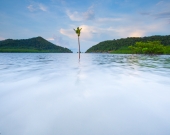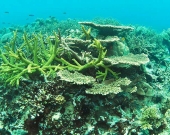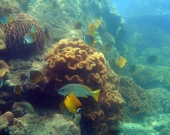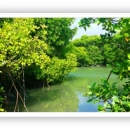Topics :: Apply knowledge :: Reef to Ridge
Reef to Ridge
The countries around the Indian Ocean and their low lying coastal zones are among the most vulnerable to impacts of environmental stresses. These stresses can be local, regional or global. Around the Indian Ocean rim, activities like port development, urban infrastructures and industries are destroying natural biomes like mangroves, estuaries and wetlands. These water bodies are not only sources of livelihoods for coastal communities but are also homes to thousands of species of plant and animals.
A big cause of concern for the health of coastal ecosystems is the increase in human activity along the coastal zones. However, it is increasingly becoming evident that human activities carried out in further inland areas bear significant impacts on the health of coastal ecosystems. Simply put, activities carried out upstream bear consequences downstream. Agriculture, irrigation, fertilizer and pesticide use, deforestation in the hills, building of dams etc. ultimately end up affecting overall coastal ecosystem health.
MFF brings this knowledge and understanding in its “reef to ridge” approach to help implementing bodies in taking far-sighted decisions. Via “reef to ridge”, MFF stresses on the need to address coastal ecosystem management at a broader level. It highlights the need for an inclusive approach in developing policies where coastal and inland planners and managers are associated by a knowledge bridge.
For details about Actions, Outputs and Results, click [ + ]
Related News
Mangroves against the storm
Global 16 Nov 2017
Country: Global
Topic: Climate change, Coastal Governance, Reef to Ridge
"By digging their roots in tropical shores, mangroves not only defend against rising tides and extreme weather, but they have the potential to change the storm itself."
Koh Rong National Marine Park: A first for Cambodia
Koh Rong, Cambodia 14 May 2018
Country: Cambodia
Topic: Civil Society Engagement, Coastal Governance, Marine Protected Areas ...
On 8 February 2018, the Cambodian government announced the establishment of the Koh Rong National Marine Park (NMP) – a first for the country. The park covers over 52,000ha – an area two thirds the size of Bangkok – along the coast of Preah Sihanouk ...
Blue Economy for Climate Change Resilience: Towards Partnerships and Collaboration
Bangkok, Thailand 20 Nov 2015
Country: Thailand
Topic: Climate change, Coastal Governance, Community Resilence ...
On 23 November 2015, representatives from 11 countries, experts from international agencies, civil society and NGOs will come together for a thematic consultation on the “Blue Economy for Climate Change Resilience: Towards Partnerships and Collaborat...
Featured Projects

Increasing the resilience of coastal and riverine communities to climate change and other threats, by conserving the ecosystems of the Maya Oya and associated coastal wetlands in Sri Lanka
Duration: 24 months
Location: Negombo and Katana DS Divisions in the Gampaha District (Western Province) and Wennappuwa and Dankotuwa DS Divisions in the Puttalam District in the North-Western Province, Sri Lan...
Topics: Knowledge for Management , Reef to Ridge , Economic Valuation , Capacity Building , Civil Society Engagement , Integrated Coastal Planning , Strategies for Management
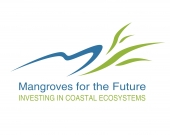
Enhancing community and island ecosystem resilience through innovative technology and food security
Duration: 24 months
Location: Baa Atoll - five islands in the North Province of the Republic of Maldives: Kudarilkilu, Kamadhoo, Kilhahdoo, Dharavandhoo and Maalhos
Topics: Reef to Ridge , Civil Society Engagement , Sustainable Livelihoods , Climate change , Gender equality
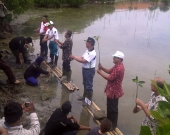
Community-based environmental coastal management in Demak, Province of Central Java
Duration: 24 months
Location: Four villages (Sriwulan, Bedono, Timbulsloko, Surodadi) of the District Kacamatan of Sayung, the Regency of Demak, the Province of Central Java
Topics: Strategies for Management , Reef to Ridge , Economic Valuation , Civil Society Engagement , Sustainable Livelihoods , Community Resilence
Featured Film - Mangroves for the Future by UNDPRCB
Mangroves for the Future by UNDPRCB © IUCN, UNDP
With the support of the UN Office for the Special Envoy for Tsunami Recovery, IUCN has led the initial development of the initiative "Mangroves for the Future: A Strategy for Promoting Investment in Coastal Ecosystem Conservation." Launched in September 2005, the Initiative aims to address the need for better regional and national coordination as well as the need for sustained investment in coastal ecosystem management. The initiative involves collaboration between multiple partners, including government agencies, NGOs and CBOs, research institutes and universities, UN agencies and other multilateral bodies. Mangroves for the Future involves countries affected by the 2004 Indian Ocean Tsunami: Bangladesh, India, Indonesia, Kenya, Malaysia, Maldives, Seychelles, Sri Lanka, Tanzania, and Thailand. The video was presented at the donor roundtable discussion held on 12 September 2006 in New York.
Related Events
MFF Phase 3 Regional Completion Workshop
Bangkok, Thailand 17 Dec 2018
MFF Phase 3 National Completion Workshops
Each MFF country 01 Nov 2018
14th Regional Steering Committee Meeting
Yangon, Myanmar 28 Sep - 02 Oct 2017
Related Press Releases
Regional symposium puts spotlight on the need to protect marine biodiversity and Asia’s coastal fisheries
Kochi, India 28 Oct 2013
Representatives from more than 12 countries attended a Regional Fisheries Symposium from October 28 to 30 in Kochi, India with the goal of exploring ecosystem-based approaches to protecting fisheries and marine biodivers...
Related Images
Related Publications
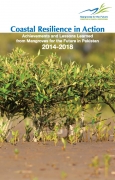
Coastal Resilience in Action - Achievements and Lessons Learned from Mangroves for the Future in Pakistan 2014-2018
Author: Zaigham Khan / MFF Pakistan
Publisher: MFF Pakistan
Posted on: 15th Feb 2019
Category: SGF (Small Grant Facility)
Size: 4.5 MB
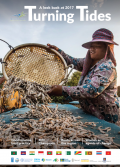
Turning Tides Magazine
2017 in Review
Author: Various
Publisher: MFF
Posted on: 31st Jul 2018
Category: Asia Region (Secretariat)
Size: 9.1 MB
